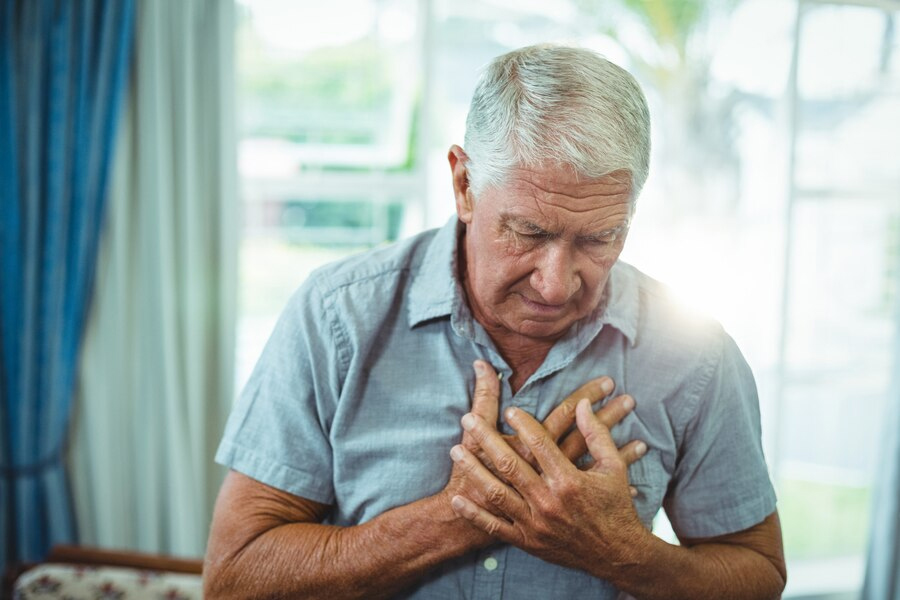
The human body is full of surprises, with symptoms often related to multiple health conditions. For instance, a burning sensation in the chest is one of the telltale signs of a heart attack, but it can also signal benign issues like acidity or gas. Not addressing or differentiating between the conditions can often lead to misdiagnosis, which can delay or lead to unnecessary or unsuitable treatments.
Table of Content:-
In an interaction with the OnlyMyHealth team, Dr Rahul Chhabria, Associate Director - Emergency Cardiology, Jaslok Hospital & Research Centre, Mumbai, explains the key differences between heart attack and gas-related pain, highlighting the distinguishing factors in their symptoms.
Also Read: Important Precautions Heart Patients Should Take Amid Severe Air Pollution
Heart Attack Versus Gas

Both gas and a heart attack can cause chest pain that feels like pressure or tightness. However, the causes of their onset may vary.
Gas pain usually occurs when gas builds up in the digestive tract from swallowed air or the digestive process. It can be caused by digestive issues or eating certain foods. This gas can put pressure on your diaphragm, which can cause chest pain.
On the other hand, a heart attack causes chest pain because it blocks blood flow to the heart muscle, which reduces the amount of oxygen reaching the heart.
How To Distinguish Between Heart Attack And Gas

Differentiating between chest pain associated with a heart attack and gas, Dr Chhabria says, "Most of the patients with heart attacks come with complaints of chest pain, more on the left side of the chest, and most of the time they have the same pain coming into the left arm, neck, jaw, or back."
"They describe that they have never suffered this type of pain in the past. Most of them also have unexplained sweating along with this pain," he adds.
Furthermore, the doctor shares some features that favour gastric pain and some that favour heart attack.
Most of us have suffered gastric acidity-type pain sometime in our past. Typical characteristics include:
- A burning sensation in the chest that may also involve the upper abdomen
- Usually occurs after eating or while lying down or bending over
- May awaken you from sleep, especially if you have eaten within two hours of going to bed.
- Is usually relieved by antacids
- May be accompanied by a sour taste in your mouth—especially when you're lying down.
- May be accompanied by a small amount of stomach contents rising up into the back of your throat (regurgitation).
On the other hand, some typical features of heart attack-related chest pain are as follows:
- Pressure, tightness, pain, or a squeezing or aching sensation in your chest or arms that may spread to your neck, jaw, or back
- Nausea, indigestion, heartburn, or abdominal pain
- Shortness of breath
- Cold sweat
- Fatigue
- Lightheadedness or sudden dizziness
Also Read: What To Expect After A Heart Attack: Expert Explains Recovery, Challenges, And Heart Healthy Tips
When To Seek Medical Attention

Being alarmed is not the answer, but if you have concerning symptoms, especially those that are related to a heart attack, seek medical attention immediately. Some of the common red flags that prompt urgent medical care include:
- Typical pain on the left side of the chest radiating to the left arm, neck, or back.
- Unexplained sweating
- Breathing difficulty
- Chest discomfort or tightness, which they have never experienced in the past
In addition, people with pre-existing heart conditions and older adults should remain vigilant. Experts advise regular health screenings for men over 45 and women over 55, as these age groups of people are more likely to have a heart attack.
Also watch this video
Read Next
Could Being Too Nice Make You Sick? The Surprising Link Between People Pleasing And Health Issues
How we keep this article up to date:
We work with experts and keep a close eye on the latest in health and wellness. Whenever there is a new research or helpful information, we update our articles with accurate and useful advice.
Current Version